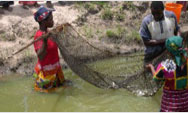Zambia
USAID's Strategy in Zambia
With ongoing conflict in its largest neighbor—the Democratic
Republic of Congo—and political and economic instability
in another neighbor—Zimbabwe—a stable, democratic,
and prosperous Zambia is important for the United States and
the region. Zambia’s transition to a multiparty democracy
and market-based economy continues to progress slowly, but positively.
Unfortunately, this progress has been impeded by the country’s
legacy of corruption, limited foreign and domestic investment,
and until recently, poor performance in the critical copper
industry. As a result, per capita income plummeted from $752
in 1965 to $351 in 2002. USAID concentrates on increasing private
sector competitiveness in agriculture and natural resources,
improving the quality of basic education for more school-aged
children, improving the health of Zambians, and increasing government
accountability.
SUPPORTING ECONOMIC GROWTH
Agriculture continues to be central to the Zambian economy,
with more than 67 percent of the workforce in agriculture, forestry,
and fisheries. But high transportation costs, weak market infrastructure,
uneven production and inconsistent quality, and cyclical drought
make growth in this sector challenging. USAID strengthens the
Zambian financial sector’s contribution to economic growth;
increases participation in global trade and investment; improves
economic policy; improves sustainable management of natural
resources; increases food security; and promotes public-private
alliances as a principal business model. As a result, USAID
supported groups increased their incomes to $8.1 million in
FY2004 from $5.96 million in FY2003. Over 7,000 households living
in game management areas around the Kafue National Park were
trained in sustainable agricultural and natural resource enterprise
activities, which helped them earn $246,292 in 2004. This has
dissuaded them from illegally poaching animals in the game management
areas.
IMPROVING BASIC EDUCATION
Only 60 percent of Zambian children who start primary school
actually complete it. USAID’s program helps to increase
access to education for girls and other vulnerable children,
improves the health and nutrition status of pupils, supports
teacher training, and strengthens the Ministry of Education’s
(MOE) policy reforms. The interactive radio instruction (IRI)
program is a vital way to reach school age children who are
not enrolled in government schools using radio to broadcast
lessons. Nearly 650 IRI centers enroll more than 38,000 children
who would otherwise have no access to education. Another USAID
program trains teachers in the administration of drugs for the
treatment of bilharzia (a parasitic disease) and vitamin pills
to improve students’ health. Other activities help the
MOE address the impact of HIV/AIDS.
IMPROVING THE HEALTH OF ZAMBIANS
Eighteen percent of Zambian children die before their fifth
birthday and an estimated 15 percent of Zambians between ages
15 and 49 have HIV. USAID is helping the country address these
and other health issues in communities and nationwide. USAID
supports vitamin A supplementation through twice-yearly national
Child Health Weeks. The micronutrient profoundly affects child
survival by increasing resistance to illness. The July 2004
campaign reached 92 percent of children 6 to 59 months old.
As leader in the fight against HIV/AIDS, USAID support has
led to 250 voluntary counseling and testing sites opening across
the country. A 24-hour toll free HIV/AIDS talk-line averaging
about 500 calls per day was launched to provide information,
counseling and referrals to assist clients in accessing services
for prevention, treatment and care nationwide. Additionally,
USAID/Zambia includes HIV/AIDS education messages in all of
its work, not just in the health sector.
INCREASING GOVERNMENT ACCOUNTABILITY
Fighting corruption is one of the government’s stated
top three priorities, along with encouraging economic growth
and combating HIV/AIDS. The USAID democracy and governance program
in Zambia supports law, policy and institutional reforms to
develop a more accountable government. Core activities focus
on increasing civil society demand for transparency, greater
public sector accountability, and helping to strengthen oversight
institutions. USAID is working with the government of Zambia
to open constituency offices for Members of Parliament across
the country so that rural residents can easily contact their
representatives. Reception has been very favorable, with 300
visits to the first office—in Dundumwenzi—in June
2004 alone.
Back to Top ^
|


